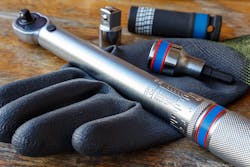8 Factors to Consider Before Buying a Torque Wrench
Purchasing a torque wrench may seem simple but it can get overwhelming if you don’t know what features to look for. Since it's a precision tool, you need to focus on key factors that will determine its durability and functional accuracy.
Regardless of your choice, remember that calibrating a torque wrench is essential for accuracy.
8 Important Factors to Consider
1. Brand
A good brand will be durable and offer accurate results, while a mediocre brand might break down or get damaged easily. Regular calibration of a torque wrench is necessary even for the best brands.
2. Types
There are at least 3 types of torque wrenches you can choose from based on the features they offer:
- Beam type: This is the oldest type
- Digital wrench: It has a loud notification when the correct torque is applied and has a great memory. Preferred for general automotive work
- Interchangeable head torque wrench
3. Price
Torque wrenches are available at different prices. Some offer more features at a high price, others may not cost much due to fewer features. Don’t compromise features for the price. Investing in a high-quality and feature-loaded wrench will be worth it.
4. Quality
Using a high-quality torque wrench will avoid inefficiencies and save money as it won’t get damaged easily.
If you use a torque wrench of substandard quality, it will affect the quality of the project too. The wrench will get damaged easily and cost more in the long run.
5. Size
There are four different sizes of square head range, all of which correspond to different torque ranges and functions.
- The 1/4 in. drive: Suitable for small nuts and bolts like on garden equipment, bicycles, and motorcycles. They produce between 4 to 21 ft-lb (5 to 28 Nm) of torque.
- The 3/8 in. drive: Suitable for a majority of automobiles such as passenger vehicles, light trucks, and cars. They produce 15 to 75 ft-lb (20 to 102 Nm) of torque. It's the most versatile size and covers a wide range of functions.
- 1/2 in. drive: Covers larger nuts and bolts like in engine mounts and suspensions.
- 3/4 in. drive: Essential for special applications like large cargo aircraft and tractor-trailers.
6. Accuracy and Calibration
Torque wrenches have different accuracies. Choose a wrench with an accuracy of plus or minus 5%. Check the torque wrench calibration for the date and accuracy per the manufacturer’s settings. When a torque wrench is well-calibrated, it will have clear scale visibility.
7. Storage
The longevity and accuracy of the torque wrench depend on how well it's stored. Most torque wrenches come with storage cases but if it doesn’t come with one, buy a case immediately. This will help in protecting calibrators.
8. Materials
The materials of wrenches determine their durability. Buy wrenches that are made of strong metallic materials as they last longer. Avoid plastic ones since they break easily.
Once you determine what function you need the wrench to perform, you can make an informed choice.
Keep these factors in mind and purchase the torque wrench that's best suited for your needs.
About the Author
Edward Simpson
Edward Simpson works for RS Calibration Services and has a knack for finding faults in machines and does not rest until they are rectified to perfection. He lives in Pleasanton, CA and loves to write about how machines work and about the importance of proper care and calibration of equipment. When he's not working or writing, he loves to run to stay fit.
